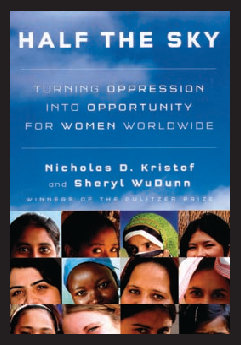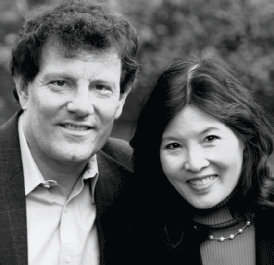 Married journalists Nicholas Kristof and Sheryl WuDunn won the Pulitzer Prize for their coverage of the pro-democracy protests in Beijing’s Tiananmen Square. They’ve since turned their attention to what they call the moral challenge of our time: the plight of women in the developing world. In their book Half the Sky, they explore such issues as forced prostitution, maternal mortality, female genital mutilation, HIV infection, and barriers to education and employment. In an excerpt, they describe why liberating girls from brothels is “the easy part.”
Married journalists Nicholas Kristof and Sheryl WuDunn won the Pulitzer Prize for their coverage of the pro-democracy protests in Beijing’s Tiananmen Square. They’ve since turned their attention to what they call the moral challenge of our time: the plight of women in the developing world. In their book Half the Sky, they explore such issues as forced prostitution, maternal mortality, female genital mutilation, HIV infection, and barriers to education and employment. In an excerpt, they describe why liberating girls from brothels is “the easy part.”
Exposing the plight of women in the developing world

After covering the pro-democracy protests in Beijing's Tiananmen Square for the New York Times—work that won them the Pulitzer Prize for journalism—Sheryl WuDunn '81 and Nicholas Kristof learned a startling fact. While the hundreds of lives lost in the unrest had made international headlines, each year in China some 39,000 baby girls were dying for lack of sufficient medical care and attention due to the cultural preference for boys—but the media paid no notice. "Newspapers inherently cover events that happened yesterday," observes WuDunn, a Cornell trustee. "This is something that happens every day."
That detail—that each week, as many baby girls were dying unnecessarily as the total number of protesters who perished in Tiananmen—prompted the couple to turn their attention to the challenges facing women in the developing world. In their many travels, WuDunn and Kristof have seen countless atrocities, women trapped in lives that most Americans could barely imagine. "When I was in Cambodia I saw a thirteen-year-old girl who had been forced into prostitution, and when she tried to rebel, the brothel owners gouged out her eye," WuDunn recalls. "That's the kind of stuff you cannot walk away from. We've always been taught to keep balance and distance, but there's a human side of you that screams, 'This is wrong.' We thought it was crying to be written about."
The result is Half the Sky: Turning Oppression into Opportunity for Women Worldwide. Published in September by Knopf, the book—which takes its title from a Chinese proverb that "women hold up half the sky"—chronicles the struggles and triumphs of women around the globe, exploring such issues as forced prostitution, maternal mortality, female genital mutilation, domestic violence, gang rape, HIV infection, honor killings, and barriers to education and employment. Half the Sky also offers practical advice on how readers can help women in developing countries, such as making microfinance loans via organizations like kiva.org, sponsoring a girl through an aid agency, and speaking out to policymakers. "Ordinary Americans can really make a difference in the lives of women abroad," she says. "You don't have to be a millionaire. You can spend some time, donate your expertise. There are many ways to help." The authors geared the book toward a mass audience, she says, in part because making average Americans care about the plight of women abroad is key to spurring their elected officials to action. "Engaging as many people in the U.S. as possible," she says, "is critical to bring about real change."
{flvremote}http://prendismo.com.s3.amazonaws.com/media/1/WuDunn15_audienceForBook.flv{/flvremote}
Importance of Enlightening Ordinary Americans About Global Challenges (1:33)
Video provided courtesy of Prendismo, LLC – www.prendismo.com
A history major on the Hill, WuDunn holds an MBA from Harvard and a master's in public administration from Princeton's Woodrow Wilson School. She calls herself a "former" journalist, having left reporting to work in the business world, including a stint at Goldman Sachs. She and Kristof, a Times columnist who won a second Pulitzer for his work on Darfur, live outside New York City with their three children. In August, they won the Dayton Literary Peace Prize for Lifetime Achievement; their other books include China Wakes: The Struggle for the Soul of a Rising Power and Thunder from the East: Portrait of a Rising Asia.
WuDunn is currently focusing on multimedia efforts to further the Half the Sky movement, including a Web-based social action game, a documentary series profiling women in the book, and a TV special she calls a "modern-day telethon." "We think this issue—the brutality that is inflicted on so many people in so many countries because of their gender—is the moral challenge of our time," says WuDunn. "Just as slavery was in the nineteenth century, this is the injustice of this century."

On top of the moral imperative to aid women, WuDunn notes that their oppression has serious economic ramifications; she points out that a major factor in jump-starting China's economic growth was the movement of women into factories, fueling its apparel export industry. In Half the Sky, she and Kristof offer an anecdote about a speech Bill Gates gave before a gender-segregated audience in Saudi Arabia. The women—comprising a fifth of listeners—sat separately, clad in black cloaks and veils. Asked if it was realistic for the nation to reach the top ten in technology by 2010, Gates replied that it was unlikely given that it was under-utilizing so much of its population. A certain fifth of the audience erupted in cheers. "There's no way a country like Saudi Arabia can move the needle on their GDP unless they start moving women into the labor force," WuDunn says. "They're not utilizing half their talent."
— Beth Saulnier
{flvremote}http://prendismo.com.s3.amazonaws.com/media/1/WuDunn07_femalesInChina.flv{/flvremote}
Sheryl WuDunn Discusses Impact When Societies Place Less Value On Women (2:45)
Video provided courtesy of Prendismo, LLC – www.prendismo.com


